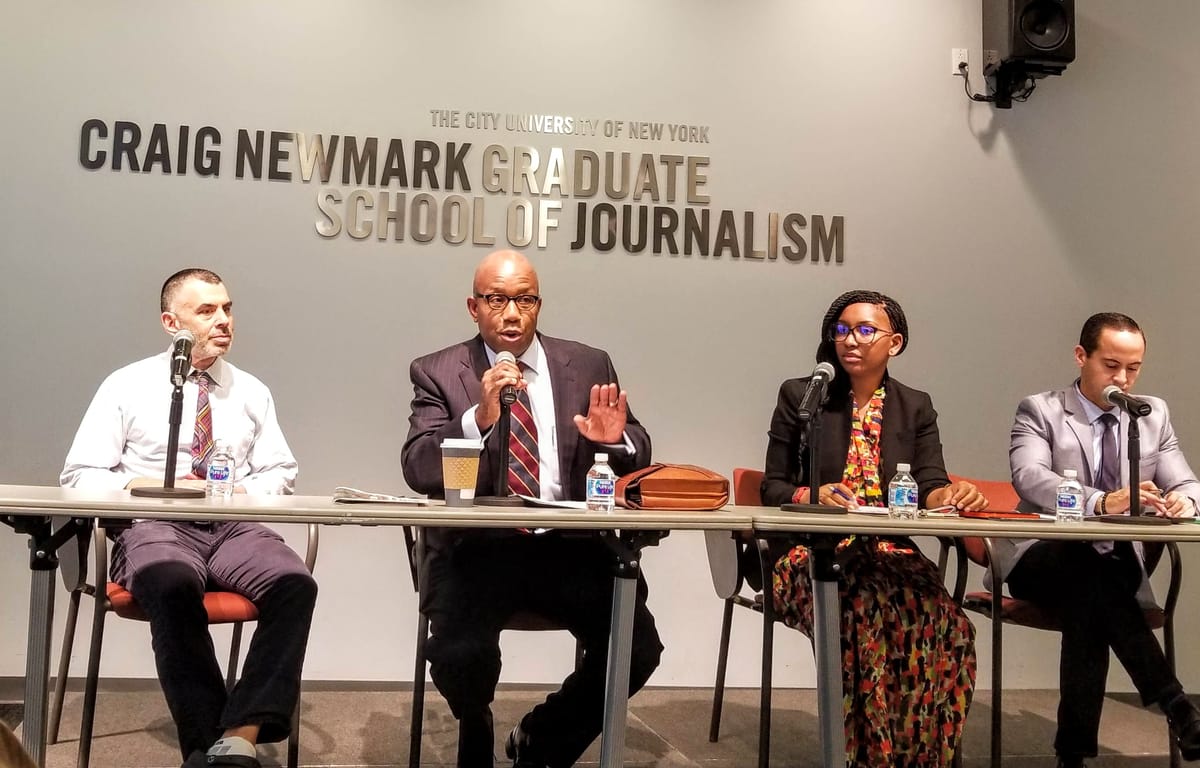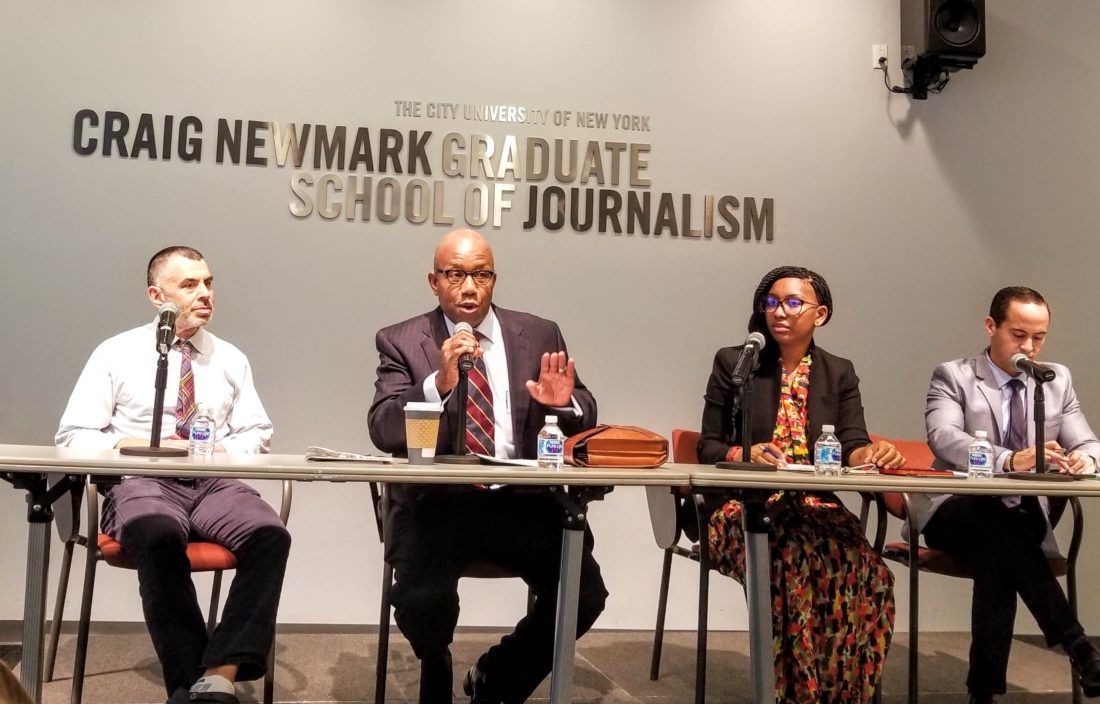Dr. Katz on Taking Care of New Yorkers In Unusual Situations, And Reasons To Get Up In The Morning


Last week in a conversation with local journalists at Craig Newmark Graduate School of Journalism at the City University of New York, the President and CEO of NYC Health + Hospitals, Dr. Mitchell Katz, talked about what he sees as important issues at the city’s hospital system, and the health of the community at large. Dr. Katz, who was born and raised in Brooklyn, took the helm of Health + Hospitals in January of 2018, having served in Los Angeles and San Francisco before returning to his hometown.
NYC Health + Hospitals is the largest public health care system in the United States. It has a budget of $7 billion, 42,000 employees, operates 11 community hospitals (Coney Island, Kings County and Woodhull in Brooklyn) and 70 outpatient facilities across the city, has its own health plan, MetroPlus, and operates with the mission of serving all, regardless of their ability to pay.
Conversation and questions focused on worries about the financial state of Health + Hospitals, which had a budget deficit of $1.8 billion dollars at the beginning of this year, to the quality of care – especially where it comes to maternal health, mental health, and addiction – to care for the undocumented and those looking to secure permanent status in light of the proposed changes in how Public Charge is applied to those seeking residency or citizenship.
Dr. Katz said he is neither looking to close any hospitals, nor to open new ones at this time, but to work on reducing the deficit, which includes changing the mindset as well as systems at the institution. The deficit, he believes, was caused in part by the mission of Health + Hospitals – “we are so known for taking care of people regardless of their ability to pay – that we forgot we were supposed to bill people who had insurance”, Dr. Katz said, noting that they reduced the deficit by $150M just by accurate billing just in the first 6 months of this year.
Health + Hospitals is also aggressively going after private insurance companies refusing to pay for the care provided. In particular, suing United Healthcare for over $40M in denied payments for cases such as care for a four-year-old that was brought unresponsive to the hospital’s emergency room because the insurer deemed the unresponsive four-year-old should have been taken care of in an outpatient setting, Dr. Katz said. They are also reviewing their referrals and reminding everyone – internally and externally – that Health + Hospitals takes care of both, uninsured and insured patients. Dr. Katz very much supports the New York Health Act for its ability to help streamline the bureaucracy of billing, which accounts for about 30% of medical expenses in the US.
Maternal deaths were a big focus this year, following an expose by ProPublica last year that focused on outcomes in Brooklyn among others and Health + Hospitals is doing their part to address it. In particular, Dr. Katz discussed the institution of a Transfusion protocol. Maternal bleeding is the most common cause of maternal deaths postpartum, and they want to make sure that there is no delay in getting blood to the patient when needed. Dr. Katz also talked about the way we approach mental health in this country, and how it makes little sense to abandon patients who have been in the hospital setting because they cannot take care of themselves to be discharged to navigate a complex system for help all on their own a few days later with no continuity of care. He also remarked on New York being somewhat unique in everyone wanting to see a specialist, and everyone undervaluing the primary care providers.
Addressing immigrant concerns, Dr. Katz said there have been no sightings of ICE in the hospitals, that Health + Hospitals does not keep records of the immigration status of their patients and would aggressively protect their privacy, but noted that the newly proposed Public Charge rules are of concern.
Department of Homeland Security released new rules on September 21, proposing applying the Public Charge to benefits that may include health care, which has not been done before. Public Charge is not a new concept, dates back to 1892 in Federal Immigration law, but has never been applied to health benefits in considering one’s application for a permanent status. The new proposal changes that.
One example Dr. Katz offered, showed how in a mixed family, where one parent was here legally, and the other was undocumented, and say the children were citizens. If the parent who was here legally qualified for Medicaid and used it to access services, that fact could be used against the other parent obtaining permanent status, arguing that the family is drawing on public aid. He went on to say that the rule is not yet in effect, and even once passed, cannot be held retroactively against people who have relied on the services.
New York Health+Hospitals, Dr. Katz stressed over and over, is welcoming to all. It is there for those who cannot access care elsewhere, and there for the unusual situations. One such being when immigrant children were being separated at the border from their parents and sent to foster homes in the Bronx. Katz said Health + Hospitals learned of it in part because the children were given an obscure health insurance, not accepted elsewhere in the city, and thus were brought to them for care. It resulted in Health + Hospitals posting a child psychiatrist at the Cayuga center to help those children who were suicidal – not because it was a reimbursable service, but because it was and is the humane thing to do.
Lastly, he reflected on the biggest health issues he sees in the city, and after remarking on the fact that folks still smoke too much (at least as compared to California), and that opioids are an issue, he mentioned one rather different one – “meaning”.
“Meaning is meaning. Meaning is social cohesion, people having a reason to be.” Dr. Katz continued, “I’m lucky enough to have lived through a time where everybody I knew who had HIV/AIDS – all my patients died – to an era where it is an entirely treatable disease. But most things are not like that. Most things are congestive heart failure, and diabetes, and arthritis, and chronic renal disease. And the doctors are only somewhat effective at that.
“So I put a lot of my thought into how do people stay well, and I think that the things that keep people well are a reason to get up in the morning – a sense that you matter, a sense that other people rely on you, that you have a community that matters. I think one nice thing about New York is we are all thrown together in a closer way, it’s not like LA where everyone is driving somewhere, but I think it is worth thinking about – even in this crowded city – nobody in my apartment house wants to say hello to me.”




